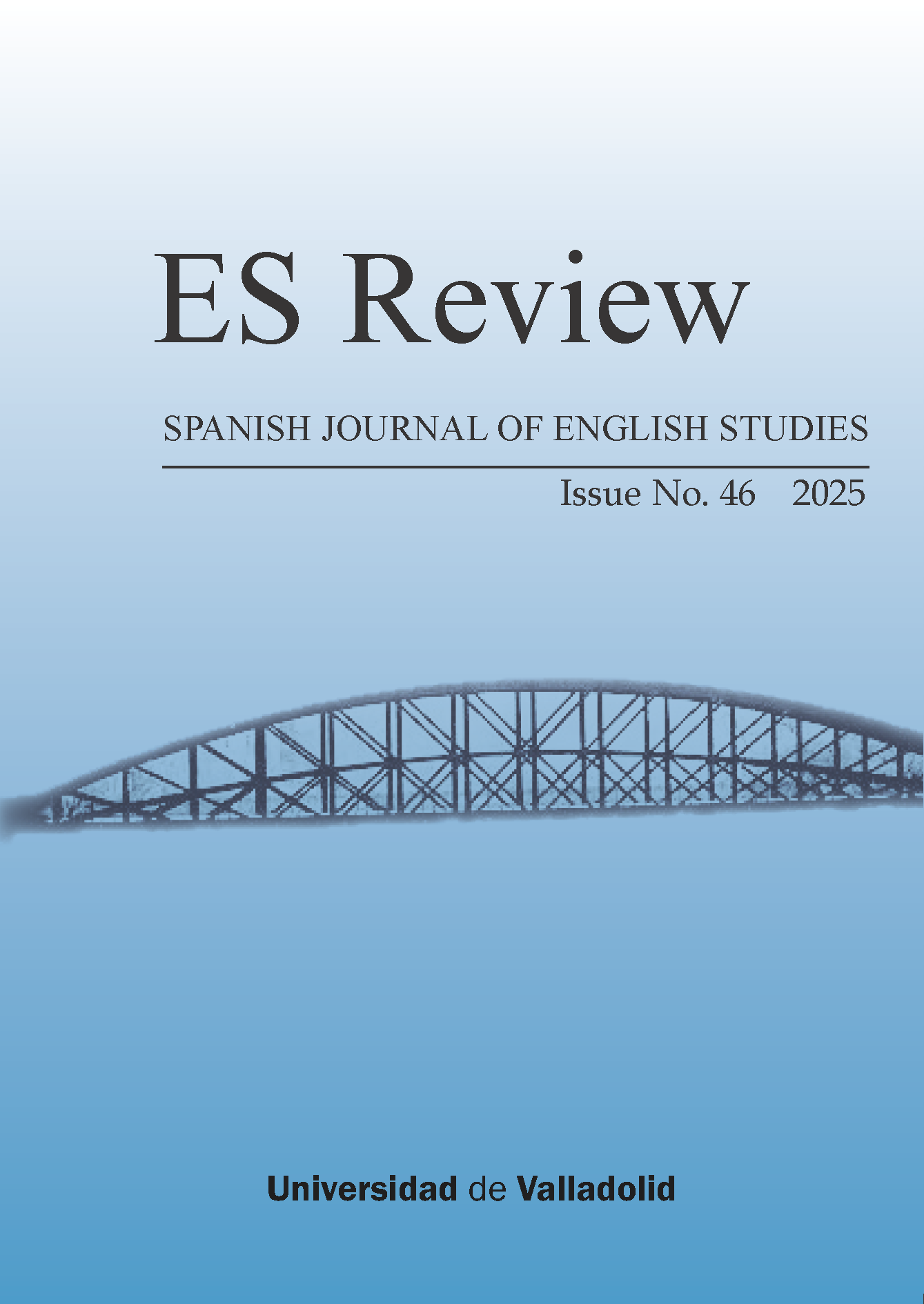Reclaiming the Past, Queering the Present: Nghi Vo’s Speculative Fiction as a Space of Narrative Hospitality
DOI:
https://doi.org/10.24197/s0x46202Keywords:
Science fiction, Queer Memory, Narrative Hospitality, Narrative RepresentationAbstract
Nghi Vo’s Singing Hill Series follows the character of Chih, a monk that has been entrusted with the task of collecting and preserving stories that either have never been recorded before or that have been deliberately excluded from the canon because they contradict national, hegemonic and cis-heteropatriarchal discourses. Throughout the course of the saga, Chih learns and writes down stories that have been neglected, erased and forgotten, and we, as readers, see how these acts of narrative preservation help to build a present in which those that have been casted as “other,” and in particular, racialized sapphic women, are able to find and recognize themselves. My argument is that the speculative elements of the novellas help to question what is thought of as normal, as possible and as real, and thus, allow for the texts to be read as spaces of narrative hospitality where sapphic women can not only reclaim their (her)stories but can also build a home and a community through them.
Downloads
References
Barba Guerrero, Paula. “Vulnerabilidad y Testimonio de Frontera: Repensando la Migración desde la Hospitalidad Narrativa en The Book of Grace de Suzan-Lori Parks.” Hospitalidad: Lo otro y sus Fronteras, edited by Rosa Benéitez Andrés, and Virginia Fusco, Dykinson, 2021, pp. 69–90.
Barba Guerrero, Paula. “Wounding the Archive: Reparative Writing in Imani Perry’s Epistolary Memoir.” Escritoras y Personajes Femeninos en Relación, edited by Daniele Cerrato, Dykinson, 2021, pp. 132–46.
Bomans, Bastien. “‘Cric, Crac, Queer’: Queer Storytellers and Story-Membering in Lawrence Scott’s Witchbroom, Shani Mootoo’s Cereus Blooms at Night and David Chariandy’s Brother.” Canadian Journal of Latin American and Caribbean Studies, vol. 46, n. 2, 2021, pp. 16–79, doi: 10.1080/08263663.2021.1882806.
Çalişkan, Dilara. “Queer Postmemory.” European Journal of Women’s Studies, vol. 26, no. 3, 2019, pp. 261–73, doi: 10.1177/1350506819860164.
Derrida, Jacques. Archive Fever: A Freudian Impression. Translated by Eric Prenowits, Chicago UP, 1996.
Dinshaw, Carolyn. Getting Medieval: Sexualities and Communities, Pre- and Postmodern. Duke UP, 1999, doi: 10.1215/9780822382188.
Dragojlovic, Ana. “Politics of Negative Affect: Intergenerational Hauntings, Counter-Archival Practices and the Queer Memory Project.” Subjectivity, vol. 11, 2018, pp. 91–107, doi: 10.1057/s41286-018-0046-1.
Foucault, Michel. Language, Counter-Memory, Practice: Selected Essays and Interviews, edited by Donald F. Bouchard, Cornell UP, 1977.
Freeman, Mark. “Charting the Narrative Unconscious: Cultural Memory and the Challenge of Autobiography.” Narrative Inquiry, vol. 12, no. 1, 2002, pp. 193–211, doi: 10.1075/ni.12.1.27fre.
Glave, Thomas. “Fire and Ink: Toward a Quest for Language, History and a Moral Imagination.” Callaloo, vol. 26, no. 3, 2003, pp. 614–21, doi: 10.1353/cal.2003.0088.
Gopinath, Gayatri. “Archive, Affect, and the Everyday: Queer Diasporic Re-Visions.” Political Emotions, edited by Janet Staiger, Ann Cvetkovich, and Ann Reynolds, Routledge, 2010, pp. 164–92.
Herman, David. “Considering Counter Narratives: Narrating, Resisting, Making Sense.” Language in Society, edited by Michel Bamberg, and Molly Andrews, Cambridge UP, 2004, pp. 278–84, doi: 10.1017/S0047404507270137.
Kearney, Richard. “Renarrating Irish Politics in a European Context.” Europeanisation and Hibernicisation, Brill, 2010, pp. 41–57, doi: 10.1163/9789042030541_004.
Manalansan, Martin F. “The ‘Stuff’ of Archives: Mess, Migration, and Queer Lives.” Radical History Review, vol. 120, 2014, pp. 94–107, doi: 10.1215/01636545-2703742.
Manzanas Calvo, Ana María, and Jesús Benito Hospitality in American Literature and Culture: Spaces, Bodies, Borders. Routledge, 2016.
Ricoeur, Paul. “Reflections on a New Ethos for Europe.” Philosophy & Social Criticism, vol. 21, no. 5–6, 1995, pp. 3–13, doi: 10.1177/0191453795021005-602.
Schultermandl, Silvia, et al. “Introduction.” Affective Worldmaking: Narrative Counterpublics of Gender and Sexuality, edited by Silvia Schultermandl, et al., Transcript Verlag, 2022, pp. 13–44.
Stone, Amy. L., and Jamie Cantrell, editors. Out of the Closet, Into the Archives: Researching Sexual Histories. State University of New York Press, 2015.
Sturken, Marita. “Narratives of Recovery: Repressed Memory as Cultural Memory.” Acts of Memory: Cultural Recall in the Present, edited by Mieke Bal, et al., New England UP, 1999, pp. 231–48.
Vo, Nghi. The Empress of Salt and Fortune. Tor, 2020.
Vo, Nghi. When the Tiger Came Down the Mountain. Tor, 2020.
Vo, Nghi. Into the Riverlands. Tor, 2022.
Vo, Nghi. Mammoths at the Gates. Tor, 2023.
Vosloo, Robert. “Archiving Otherwise: Some Remarks on Memory and Historical Responsibility.” Studia Historiae Ecclessiastiae, vol. 31, no. 2, 2005, pp. 379–99, hdl.handle.net/10500/4357/.
Watts, Gina. “Queer Lives in Archives: Intelligibility and Forms of Memory.” disClosure: A Journal of Social Theory, vol. 27, 2018, pp. 101–11, doi: 10.13023/disclosure.27.15.
Downloads
Published
Issue
Section
License
Copyright (c) 2025 Beatriz Hermida Ramos

This work is licensed under a Creative Commons Attribution 4.0 International License.
Authors retain publishing rights and grant ES Review. Spanish Journal of English Studies right of first publication.
Simultaneously, all articles and reviews published in ES Review until nº 43 are available under a Creative Commons Attribution-NonCommercial 4.0 International License (CC BY-NC 4.0) while those published from nº 44 onwards will be available under a Creative Commons Attribution 4.0 International License (CC BY 4.0), by which others are allowed to share and use their work with an acknowledgement of the work’s authorship and initial publication in this journal.
In addition, ES Review allows authors to arrange additional contracts for the non-exclusive publication of the journal’s published version of the work (e.g., in a book), with an acknowledgement of its initial publication in this journal. In such a case, authors are required to approach the editor(s)/publisher to request permission.


